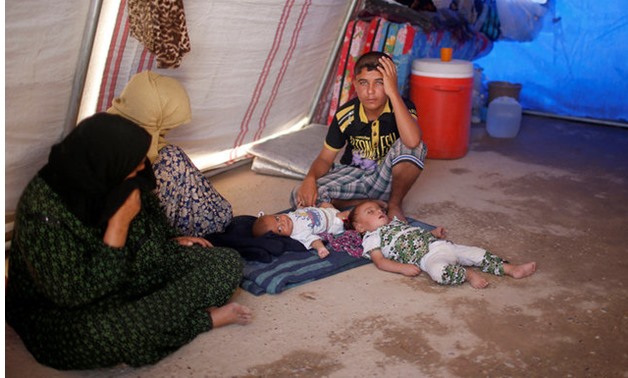
The two children of an Iraqi man whose family says he was an Islamic State militant lie on the ground at a tent in the Jada camp south of Mosul Iraq - REUTERS
GENEVA - 11 August 2017: The United Nations’ Refugee Agency (UNHCR) has been stepping up its aid effort for Iraqi families in Mosul, including for thousands who have recently returned to the city after fleeing the fighting, the UNHCR said Friday on its website.
The UN agency indicated that the field assessments show that the returning population of Mosul needs assistance of every kind, but the shelter needs are the most pressing, particularly in the western part of the city. Many neighborhoods in the west have been extensively damaged or totally destroyed during months of fighting.
Our UN partners say that of the 54 residential districts in West Mosul, 15 suffered destruction or heavy damage, another 23 areas are moderately damaged, while further 16 neighborhoods sustained light damage, it added.
Mines, unexploded ordnance and related devices pose massive risks for the city’s residents, especially children. UNHCR welcomes the ongoing mine clearing efforts by the authorities and the UN Mine Action Service to ensure safe return of the city’s displaced population. But given the magnitude of the problem, clearance work to remove all explosive hazards could take a very long time.
Returning families also face challenges in accessing basic services and utilities – accessing water, electricity or fuel in parts of Mosul can be difficult and very expensive.
So far, according to government figures, some 79,000 people returned to battered West Mosul – that is one out of every ten people who were forced to flee from this part of the city.
Also, the government says, more than 90% of families (more than 165,000 people) who had fled East Mosul during the conflict have now returned. There has been considerably less destruction in East Mosul and we witness progress in gradual resumption of day-to-day life there, it noted.
However, there are also families who have returned to camps. Managers in the IDP camps east of Mosul estimate that at least 200 families have moved back to the camps after finding living conditions difficult in Mosul. Reasons cited for their return include lack of shelter; high rental prices; a lack of livelihood opportunities and limited basic services such as electricity and water.
The statement went on to say that for returns to the city to be safe and sustainable, there must be conducive conditions on the ground. "We stress that the return of any displaced population needs to be voluntary, it has to be carefully planned and carried out on the basis of the international humanitarian principles."

Comments
Leave a Comment